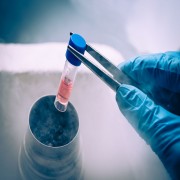Stem cell vaccine could fight off cancer
Injecting stem cells may boost a cancer patient’s immune system against tumours, a study in mice suggests

Scientists at Stanford University have found that injecting mice with induced pluripotent stem cells (iPSCs) prompts the animals' immune systems to fight back against breast, lung, and skin cancer.
The vaccine, when administered alongside an immune booster already in use in humans, also prevents cancer from recurring or spreading in animals that had tumours removed.
The iPSCs are produced using normal skin or blood cells taken from the mice and then reprogrammed into a form where the stem cells are able to become different kinds of cell in the body. They are then inactivated with radiation before they can be turned into a vaccine.
During the trial, the vaccination was administered to 75 mice. The results, published in the journal Cell Stem Cell, showed that 70 percent of the vaccinated mice fully rejected newly induced breast cancer cells, while the remaining 30 percent developed significantly smaller tumors within four weeks. The same effectiveness of the vaccine was also shown for lung and skin cancers. In one of the experiments, some of the mice that underwent surgery to remove the tumour received the iPSC vaccine with an immune booster.
Lead author Dr Joseph C. Wu at Stanford's Cardiovascular Institute and Institute for Stem Cell Biology and Regenerative Medicine explained that a significant amount of the antigens found on iPSCs are also found on cancer cells. So when the mice were given the iPSCs vaccination, their immune systems built an immune response to the antigens on the iPSCs as well as simultaneously with the cancer that shares the same antigens.
"What surprised us most was the effectiveness of the iPSC vaccine in re-activating the immune system to target cancer. This approach may have clinical potential to prevent tumour recurrence or target distant metastases," said Dr Wu to Science Daily.
The researchers hope that this study can lead to reprogramming a patient's skin or blood cells into iPSCs so that they can be used as an anti-cancer vaccine or as a follow-up booster after surgery, chemotherapy, or radiation therapy.
This story was originally published in the Global Health and Travel issue of August-September 2018.
Related Articles
What you need to know about 9 most common cancers
Cancer is the second leading cause of death globally, and is responsible for an estimated 9.6 million deaths in 2018. Globally, about 1 in 6 deaths are caused by cancer.
Read moreNew immunotherapy hydrogel to treat cancer
Researchers have developed immunotherapy drugs embedded in a slow-release hydrogel to aid in cancer treatment
Read moreMount Alvernia plans to launch a new cancer centre
The hospital picks Icon SOC to build its integrated holistic facility
Read moreLatest Articles
Medical Care
Achieving Swift Recovery: Enhanced Recovery (ERAS) Direct Anterior Approach Total Hip Replacement
Consider total hip replacement with Alps Orthopaedic Centre's ERAS Direct Anterior Approach for faster recovery and reduced hospital stays. Learn about Dr. Jerry Chen's expertise in Singapore.
Read moreMedical Care
Enhanced Recovery (ERAS) Total Knee Replacement
Discover how Alps Orthopaedic Centre's Enhanced Recovery After Surgery (ERAS) approach transforms total knee replacement into a day surgery, offering faster recovery, less pain, and reduced hospital bills. Learn about Dr. Jerry Chen's expertise and schedule your appointment in Singapore.
Read moreMedical Care
Clinical Exercise Physiologist (CEP): The Emerging of Exercise is Medicine
How Exercising can be a Medicine
Read more